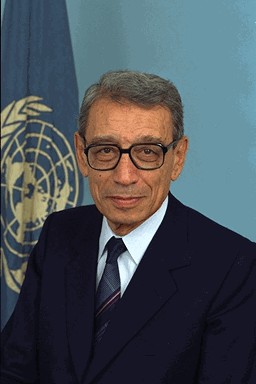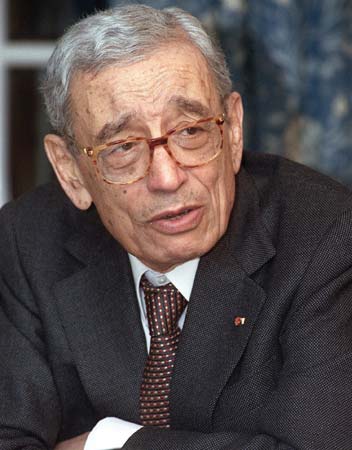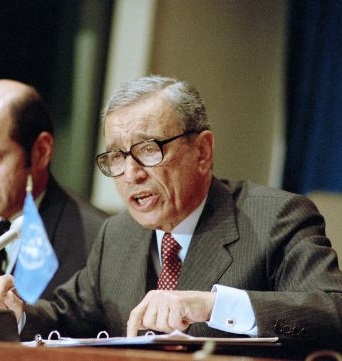<Back to Index>
- 6th Secretary General of the United Nations Boutros Boutros - Ghali, 1922
PAGE SPONSOR



Boutros Boutros - Ghali (بطرس بطرس غالى Buṭrus Buṭrus Ghālī ; 14 November 1922 - 16 February 2016) was an Egyptian politician and diplomat who was the sixth Secretary General of the United Nations (UN) from January 1992 to December 1996. An academic and former Vice Foreign Minister of Egypt, Boutros Boutros - Ghali oversaw the UN at a time when it dealt with several world crises, including the breakup of Yugoslavia and the Rwandan Genocide.
Boutros Boutros - Ghali was born in Cairo on 14 November 1922 into a Coptic Christian (Boutros being the Arabic version of the Greek name Πέτρος Pétros, meaning "Peter") family. His grandfather Boutros Ghali had been Prime Minister of Egypt from 1908 until he was assassinated in 1910.
Boutros - Ghali graduated from Cairo University in 1946.
He received a PhD in International
Law from the University of Paris and Diploma in International Relations from
the Sciences Po in 1949.
In 1979, he was appointed Professor of International Law
and International Relations at Cairo University, a
position which he held until 1999. He became President of
the Centre of Political and Strategic Studies in 1975 and
President of the African Society of Political Studies in
1980. He was a Fulbright Research Scholar at Columbia
University from 1954 to 1955, Director of the Centre of
Research of the Hague Academy of International Law from
1963 to 1964, and Visiting Professor at the Faculty of Law
at Paris University from 1967 to 1968. He was also the
Honorary Rector of the Graduate Institute of Peace
Studies, a branch of Kyunghee University Seoul.
His political career developed during the presidency of Anwar El Sadat. He was a member of the Central Committee of the Arab Socialist Union from 1974 to 1977. He served as Egypt's Minister of State for Foreign Affairs from 1977 until early 1991. He then became Deputy Minister for Foreign Affairs for several months before moving to the UN. As Minister of State for Foreign Affairs, he played a part in the peace agreements between President Sadat and Israeli Prime Minister Menachem Begin.
According to investigative journalist Linda Melvern, Boutros - Ghali approved a secret $26 million arms sale to the government of Rwanda in 1990 when he was Egyptian Foreign Minister, the weapons stockpiled by the Hutu regime as part of the fairly public, long term preparations for the subsequent genocide. He was serving as UN Secretary General when the killings occurred 4 years later.
Elected
as Secretary General, the top post of the UN, in 1991,
Boutros - Ghali's term in office remains controversial. In
1992, he submitted An Agenda for Peace, a
suggestion for how the UN could respond to violent
conflict. However, he was criticized for the UN's failure
to act during the 1994 Rwandan Genocide, which officially
left over 1 million people dead, and he appeared unable to
muster support in the UN for intervention in the
continuing Angolan Civil War. One of the hardest tasks
during his term was dealing with the crisis of the
Yugoslav Wars after the disintegration of former
Yugoslavia. His reputation became entangled in the larger
controversies over the effectiveness of the UN and the
role of the United States in the UN.
In 1996, ten Security Council members, led by African members Egypt, Guinea - Bissau and Botswana, sponsored a resolution backing Boutros - Ghali for a second five year term, until the year 2001. However, the United States vetoed a second term for Boutros - Ghali. In addition to the United States, the United Kingdom, South Korea and Italy did not sponsor the resolution, but the last three nations voted in support of Boutros - Ghali after the United States had firmly declared its intention to veto. Although not the first vetoed candidate (China vetoed the third term of Kurt Waldheim in 1981), Boutros - Ghali was the only UN Secretary General not to be elected to a second term in office. He was succeeded at the UN by Kofi Annan.
Richard Clarke (American counter terrorism czar), Michael Sheehan, and James Rubin participated in what they called "Operation Orient Express". Clarke wrote:
Albright and I and a handful of others (Michael Sheehan, Jamie Rubin) had entered into a pact together in 1996 to oust Boutros - Ghali as Secretary General of the United Nations, a secret plan we had called Operation Orient Express, reflecting our hope that many nations would join us in doing in the UN head. In the end, the US had to do it alone (with its UN veto) and Sheehan and I had to prevent the President from giving in to pressure from world leaders and extending Boutros - Ghali's tenure, often by our racing to the Oval Office when we were alerted that a head of state was telephoning the President. In the end Clinton was impressed that we had managed not only to oust Boutros - Ghali but to have Kofi Annan selected to replace him. (Clinton told Sheehan and me, 'Get me a crow, I should eat a crow, because I said you would never pull it off.')
Richard Holbrooke wrote that the United States was opposed to Boutros - Ghali because of the latter's reluctance on approving NATO bombing in Bosnia (something that Kofi Annan supported). He notes that United States opposition to the Secretary General was opposed by all its allies. Stanley Meisler, biographer of Kofi Annan, writes that Boutros Ghali's reluctance in bombing the Serbs in Bosnia stemmed from French and British opposition to the tactic, as both countries had provided most of the UN peacekeepers and feared that the Serbs would retaliate against their soldiers.
Meisler instead suggests that Clinton sought to veto
Boutros Ghali's second term to increase his own
popularity, as Senator Bob Dole, who was running against
Clinton in 1996, had gotten a few votes by repeatedly
denouncing Boutros - Ghali vehemently.
From 1997 to 2002 Boutros - Ghali was Secretary General of La Francophonie, an organization of French speaking nations. From 2003 to 2006, he served as the Chairman of the Board of the South Centre, an intergovernmental research organization of developing countries. He later served as President of the Curatorium Administrative Council at the Hague Academy of International Law. In 2003 Boutros - Ghali was appointed as The Director of the Egyptian National Council of Human Rights, where he remained until Autumn 2012.
Since April 2007 Boutros - Ghali supported the Campaign for the Establishment of a United Nations Parliamentary Assembly and was one of the initial signatories of the Campaign's appeal. In a message to the Campaign, he stressed the necessity to establish democratic participation of citizens at the global level.
Since 2009 he also participated as jury member for the
Conflict Prevention Prize awarded every year by the Fondation Chirac.
Boutros-Ghali died aged 93 in a Cairo hospital after being admitted for a broken pelvis or leg on 16 February 2016. A military funeral was held for him with prayers led by Pope Tawadros II of Alexandria. He is buried at Petrine Church in Abbassia, Cairo.
As Secretary General, Boutros - Ghali wrote An Agenda for Peace. He has also published two memoirs:
- Egypt's road to Jerusalem (1997), about the Israel - Egypt Peace Treaty;
- Unvanquished: A U.S. - U.N. Saga (1999), about his time as Secretary General at the U.N..